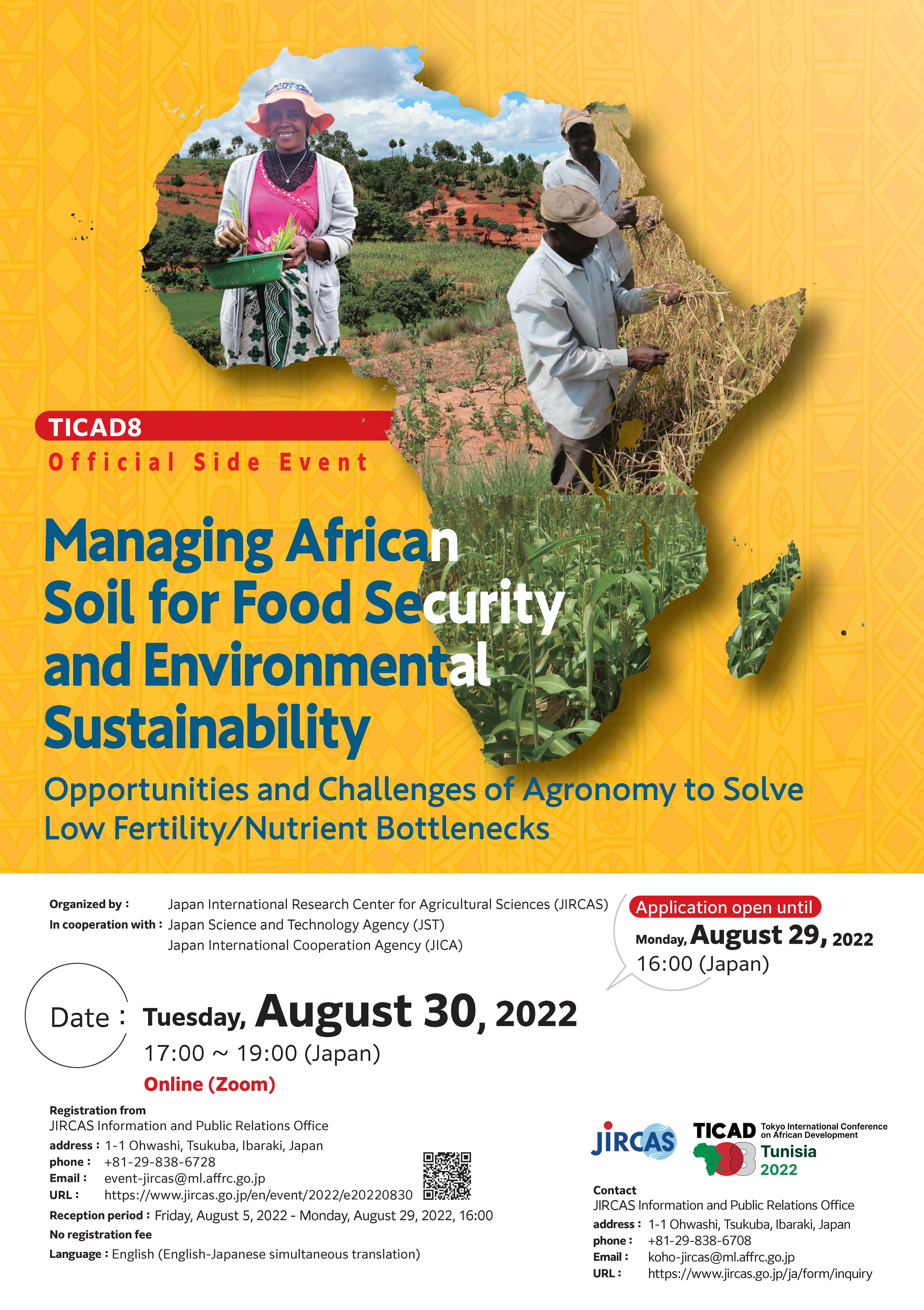TICAD8 Official Side Event “Managing African Soil for Food Security and Environmental Sustainability” - Opportunities and Challenges of Agronomy to Solve Low Fertility/Nutrient Bottlenecks -
African countries have long experienced stagnant growth in agricultural productivity. While the population of sub-Saharan Africa has grown 4.7-fold from 200 million to 1 billion since the 1960s, cereals production has increased 4.5-fold (FAOSTAT). During the same period, as the cereal yield has increased 1.9-fold to 1.5 t/ha, the increase in food demand has been mainly met by the expansion of agricultural lands. Low soil fertility and poor soil nutrients due to highly weathered soil has been one of the underlying factors for the stagnant agricultural productivity in Africa. Another limiting factor is the low application of fertilizers, most often imported, thus not always available and affordable for resource-constrained farmers. Furthermore, extreme diversity in soil types across landscapes as well as fine-scale fertility gradients even at a plot scale have limited the applicability of blanket recommendation of optimal fertilizer application. In addition, a recent surge of fertilizer price in the international market is expected to exacerbate the food security in Africa.
Extensive soil mining under low-input/low-output systems without replenishing soil with essential nutrients can accelerate soil loss and degradation. In the worst case, abandonment of unproductive agricultural lands and expansion of new arable lands can lead to deforestation, degradation of ecosystems and loss of biodiversity. As Africa needs to feed its population projected to double by 2050, the risk of soil deterioration will become more severe under increasing uncertainties of climatic variabilities. There is an unprecedented need for agronomic research to realize sustainable agricultural intensification both for food security and for environmental protection. Given Africa’s extreme heterogeneity of edaphoclimatic and socio-economic conditions, however, innovations need to be tailored to locally specific contexts. Among the most needed innovations include the development of packages of best agronomy practices, such as fine-scale optimal fertilizer recommendation along with the development of breeding materials with superior nutrient utilization according to the nutrient characteristics of the field, and the development of fertilizers using locally available resources. Such innovations can contribute in maximizing agricultural productivity with minimum fertilizer application, consistent with the global food systems transformation discourses to shift from resource-intensive agriculture with inefficient and excessive use of external inputs to regenerative/circular one.
JIRCAS has a comparative advantage in technology development to address soil fertility and nutrient management in Africa through its long-term engagement in international multi-disciplinary collaborative research in countries such as Madagascar and Burkina Faso. Therefore, on the occasion of TICAD 8, we hope to share visions towards achieving soil health in Africa and lessons for scaling up/out technologies. In this seminar, we will introduce case studies on soil fertility and poor soil management technologies, and provide a forum for discussion with national and international partners interested in sustainable agriculture development in Africa, ranging from research and development communities engaged in soil fertility management, private companies with fertilizer business, NGOs and extension agencies in charge of training farmers.
Update 2022/08/22:
- Notice of change in speaker of the keynote lecture "Future of food forum: The imperative for a transformation of African agriculture" to Dr. Bernard Vanlauwe (Dr. Bernard Vanlauwe. Director R4D, Central Africa and Natural Resource Management International Institute for Tropical Agriculture(IITA)).
Update 2022/08/26:
- Notice of change in title of the keynote lecture to "Opportunities and Challenges of Agronomy to Solve Low Fertility and Nutrient Deficiencies".
- Organized by
-
Japan International Research Center for Agricultural Sciences
- In cooperation with
-
Japan Science and Technology Agency
Japan International Cooperation Agency
- Date
-
2022-8-30(Tue) 17:00~19:00 (JST)
- Place
-
Online (Zoom)
- Program
-
Managing African Soil for Food Security and Environmental Sustainability - Opportunities and Challenges of Agronomy to Solve Low Fertility/Nutrient Bottlenecks -
Language:English (English-Japanese simultaneous translation)
Time
Slot
Speakers
17:00- 17:04
Opening remarks
KOYAMA Osamu
President, JIRCAS17:04-17:07
Welcome remarks
NAGAMINE Tsukasa
Former Vice President of National Agriculture and Food Research Organization (NARO)17:07-17:10
Welcome remarks
ASANUMA Shuichi
Special advisor, Economic Development Department, JICA17:10-17:30
Keynote lecture
Opportunities and Challenges of Agronomy to Solve Low Fertility and Nutrient Deficiencies
Bernard Vanlauwe
Director R4D, Central Africa and Natural Resource Management
International Institute for Tropical Agriculture(IITA)17:30-18:00
Session 1
Technology development to solve low fertility/nutrient bottlenecks
17:30-17:40
Presentation 1-1
What are adaptive agricultures on a wide variety of soil resources in sub-Saharan Africa?
FUNAKAWA Shinya
Professor, Graduate School of Global Environmental Studies, Kyoto University17:40-17:50
Presentation 1-2
A challenge for increasing rice production on poor nutrient soils - Development and dissemination of P-dipping technique in Madagascar-
TSUJIMOTO Yasuhiro
Project Leader, Crop, Livestock and Environment Division, JIRCAS17:50-18:00
Presentation 1-3
Toward “Local Production for Local Consumption”: Aiming at production and distribution of fertilizers manufactured from African indigenous phosphate rock
NAGUMO Fujio
Senior Researcher, Crop, Livestock and Environment Division, JIRCAS18:00-18:20
Session 2
Social implementation
18:00-18:10
Presentation 2-1
Initiative through a fertilizer business for improving agricultural productivity in Kenya
WADA Akira
Senior General Manager, Africa Planning Department, Africa Division, Toyota Tsusho Corporation18:10-18:20
Presentation 2-2
Dissemination of technologies to improve soil health in Africa; SAA Experience
Stella Kabiri
Lead-Regenerative Agriculture, Sasakawa Africa Association (SAA) - Ethiopia18:20-18:25
Photo session, Coffee break
18:25-18:55
Panel discussion
Perspectives from panelists
Panel Chair (MASUDA Misa, Professor Emeritus, University of Tsukuba)
18:55-19:00
Concluding remark - A way forward
NAKASHIMA Kazuo
Program Director, Food Program, JIRCAS - Registration period
-
- (JST)
- Registration
-
Information and Public Relations Office, JIRCASRegistration deadline:(JST)
- Registration fee
No registration fee
- Archive
-
YouTube JIRCAS Channel
- Report
- Poster
-

Information and Public Relations Office, JIRCAS
-
Address1-1 Ohwashi, Tsukuba Ibaraki 305-8686 Japan
-
Telephone+81-29-838-6708
-
Emailkoho-jircas@ml.affrc.go.jp
-
URLhttps://www.jircas.go.jp/en/form/inquiry
